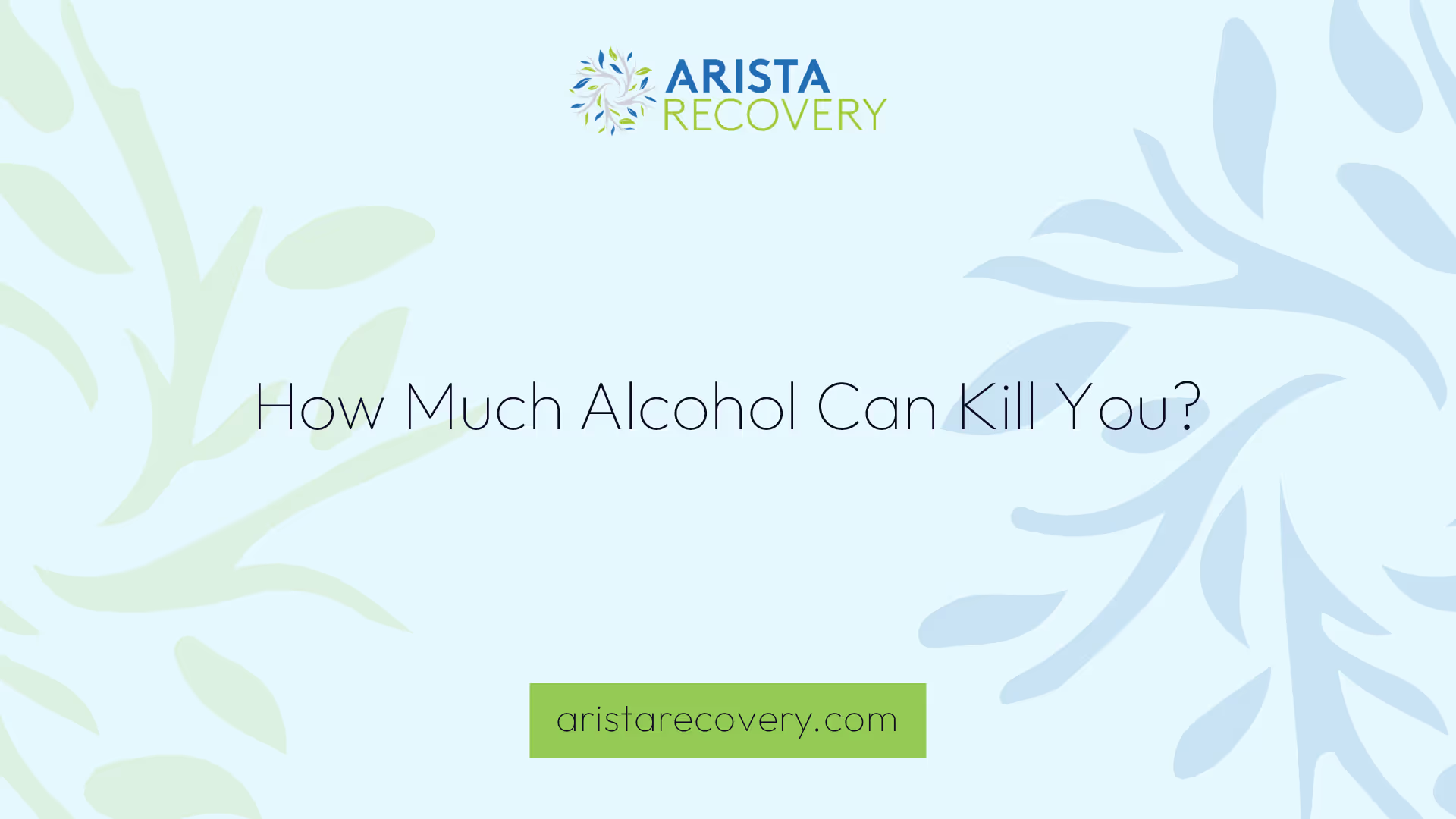
How Much Alcohol Can Kill You?
Understanding Alcohol Overdose
Exploring the alcohol overdose effects, it is important to start with a clear understanding of what an alcohol overdose is and its symptoms.

What is Alcohol Overdose?
Alcohol overdose, often referred to as alcohol poisoning, occurs when there is too much alcohol in the bloodstream for the body’s central nervous system to control. This leads to a person's blood alcohol concentration (BAC) being too high. When the level of alcohol in the bloodstream reaches a lethal dose, it can suppress the areas of the brain that control basic life-support functions like breathing and heart rate, leading to death.
Alcohol poisoning typically happens when a large amount of alcohol is consumed in a short time period. This can happen from consuming either alcoholic beverages or non-beverage alcohol sources like mouthwash or cough medicine.
Symptoms of Alcohol Overdose
Being able to recognize the symptoms of an alcohol overdose can be life-saving. These signs can include:
- Mental confusion
- Stupor
- Coma
- Inability to be awakened
- Vomiting
- Seizures
- Slow or irregular breathing
- Low body temperature
These symptoms indicate a dangerously high level of alcohol in the bloodstream and immediate medical attention should be sought.
Understanding the reality of alcohol overdose and its effects is a crucial step in both prevention and treatment. It's important to remember that while alcohol can be enjoyed responsibly, excessive consumption can have severe and life-threatening consequences.
The Impact of Alcohol on the Brain
Consuming alcohol can have a wide range of effects on the brain, varying from short-term impacts to long-lasting changes. Understanding these effects is crucial in appreciating the dangers of alcohol overdose.
Short-term Effects of Alcohol
In the short term, alcohol consumption can lead to significant changes in the brain's structure and function. One of the primary effects is on the brain's tight junction of endothelial cells and white matter thickness. Excessive alcohol consumption causes severe neuro-immunological changes in these areas, leading to potentially irreversible brain injury [3].
Another immediate impact of alcohol is on the brain's protein accumulation process. Alcohol triggers abnormal protein accumulation and lysosomal dysfunction, promoting neurodegeneration and accelerating the brain's aging process.
Long-term Effects of Alcohol
When it comes to the long-term effects of alcohol on the brain, the picture becomes even more concerning. Chronic alcohol consumption can lead to a gradual deterioration of psychological status and varying degrees of cognitive impairment, including severe dementia.
Furthermore, excessive long-term alcohol exposure has been found to downregulate the tight junction proteins responsible for maintaining the blood-brain barrier (BBB) integrity. This can lead to BBB disruption and neuroinflammation, contributing to further brain damage and cognitive impairment.
Fortunately, some alcohol-induced damage to neurons and disruption of neuronal function or connection may be reversible with alcohol abstinence and lifestyle modifications. However, this potential for recovery does not eliminate the risks associated with alcohol overdose, nor does it diminish the importance of preventing this dangerous situation in the first place.
Understanding the short-term and long-term effects of alcohol on the brain is a key part of recognizing the risks and potential consequences of alcohol overdose. It's crucial for individuals to consider these impacts when making decisions about alcohol consumption.
Dangers of Alcohol Overdose
Alcohol overdose, also known as alcohol poisoning, is a serious and potentially fatal consequence of consuming large amounts of alcohol in a short period. Recognizing the signs of alcohol overdose and understanding its immediate and long-term dangers is critical for prevention and treatment.
Immediate Dangers of Overdose
When alcohol overdose occurs, it means that there is too much alcohol in the bloodstream for the body’s central nervous system to control, leading to a dangerously high blood alcohol concentration (BAC). The immediate effects of alcohol overdose can include mental confusion, vomiting, seizures, slow or irregular breathing, and unconsciousness [4].
One of the most severe outcomes of alcohol overdose is suppression of the areas of the brain that control basic life-support functions like breathing and heart rate. This can potentially lead to a coma, or even death in severe cases.
Immediate medical attention is vital in cases of alcohol poisoning as it can be life-threatening and lead to irreversible brain damage. Recognizing the signs of alcohol overdose and seeking emergency help can be a life-saving action.
Long-term Consequences of Overdose
The long-term dangers of alcohol overdose are also severe. Chronic heavy drinking can lead to numerous health problems over time, including liver disease, heart disease, cancer, and neurological damage. It can also lead to mental health issues such as depression and anxiety, and increase the risk of suicide.
In addition to the physical and mental health risks, alcohol overdose can have significant social and economic impacts. It can lead to job loss, relationship problems, and financial difficulties. Moreover, it can result in legal troubles, such as driving under the influence (DUI) charges and other law offenses.
On a broader scale, alcohol overdose is a significant public health issue. In 2019, there were approximately 2,100 deaths from alcohol poisoning among people aged 15 and older in the United States [1].
Understanding the immediate and long-term dangers of alcohol overdose is crucial in raising awareness and promoting prevention efforts. It's important to remember that alcohol overdose is preventable, and help is available for those struggling with alcohol use disorders.
Alcohol Overdose and Different Populations
While alcohol overdose impacts individuals of all demographics, certain populations may be more susceptible to its effects. In particular, women and younger people tend to process alcohol differently, which can increase their risk of experiencing an overdose.
Alcohol Overdose in Women
Women may be especially vulnerable to alcohol overdose due to biological differences that affect how their bodies process alcohol. According to Mayo Clinic, women typically have less water in their bodies compared to men, which can lead to higher concentrations of alcohol in the blood after drinking the same amount. This can increase their risk of alcohol overdose.
Moreover, binge drinking — a pattern of drinking where a female consumes at least four drinks within two hours — can significantly increase the risk of alcohol overdose. When there is too much alcohol in the bloodstream for the body’s central nervous system to control, it leads to a high blood alcohol concentration (BAC), a primary factor in alcohol overdose.
Alcohol Overdose in Young People
Alcohol overdose is also a significant concern among young people. Their bodies are often less able to metabolize alcohol efficiently, which can increase their risk of alcohol overdose. Additionally, young people may engage in risky behaviors such as binge drinking, which can quickly lead to alcohol overdose.
According to NIAAA, in 2019, there were approximately 2,100 deaths from alcohol poisoning among people aged 15 and older in the United States. These statistics underscore the severe consequences of alcohol overdose, which can suppress the areas of the brain that control basic life-support functions like breathing and heart rate, potentially leading to death.
Understanding the unique vulnerabilities of these populations can help inform prevention and treatment strategies for alcohol overdose. By promoting responsible drinking habits and providing support for those struggling with alcohol misuse, it may be possible to reduce the incidence of alcohol overdose and its harmful effects.
Prevention and Treatment of Alcohol Overdose
Preventing alcohol overdose, as well as understanding the necessary treatment options, is a crucial part of reducing the harmful impact of excessive alcohol consumption and the resultant alcohol overdose effects.
Preventive Measures
To prevent alcohol poisoning, or overdose, several strategies can be implemented. Primarily, it is essential to limit alcohol consumption and pay keen attention to both the amount consumed and the pace of consumption. Emphasizing moderation is key, such as by adhering to a guideline of no more than one alcohol-containing beverage per hour.
Additionally, intervening for a friend or loved one who may be drinking excessively can also serve as an essential preventive measure. Recognizing that someone has alcohol poisoning and getting emergency help for them can save their life. It's critical not to wait for all the signs and symptoms of alcohol overdose to be present before seeking help [5].
Treatment Options for Alcohol Overdose
Prompt medical attention is vital in cases of alcohol poisoning, as it can be life-threatening and lead to irreversible brain damage. Therefore, one should seek immediate help by calling emergency services or a poison control center if alcohol overdose is suspected.
In a hospital setting, treatment for alcohol poisoning may include stomach pumping, intravenous fluids, thiamine, and oxygen therapy. Individuals with alcohol poisoning may also need help maintaining breathing, blood pressure, and other vital body functions.
It is essential to note that it is dangerous to try to treat alcohol poisoning at home or "sleep it off." A significant risk is choking on vomit when unconscious, which can result in death [2].
Preventive measures and immediate treatment are critical in managing alcohol overdose. Ensuring awareness and understanding of these strategies can mitigate the risks and potentially dangerous consequences of excessive alcohol consumption.
Global Perspective on Alcohol Overdose
Alcohol overdose, also known as alcohol poisoning, is a serious and sometimes deadly consequence of drinking large amounts of alcohol in a short period. Its effects are seen worldwide, but in this section, we focus on the United States and Canada.
Alcohol Overdose in the United States
In the United States, alcohol overdose is a significant health concern. According to the NIAAA, in 2019, there were 2,375 deaths due to alcohol poisoning, an average of 6 deaths every day. Additionally, the CDC reports that excessive alcohol use led to approximately 95,000 deaths each year, making it the third leading preventable cause of death in the country.
This data underlines the severity of the situation and emphasizes the need for preventive measures and effective treatments for alcohol overdose in the United States.
Alcohol Overdose in Canada
In Canada, while exact statistics for alcohol overdose are not readily available, the country offers various services to help individuals dealing with substance use, including alcohol overdose. According to Health Canada, these services include overdose prevention and tobacco cessation, available to anyone, anywhere, at any time.
Naloxone, a medication used to block the effects of opioids, is accessible in pharmacies across Canada. There are resources that provide a list of pharmacies carrying naloxone, as well as programs like the Naloxone Finder-Take Home Program, which lists naloxone distribution sites.
Individuals can also contact various services for support related to substance use issues through texting, calling, chatting, email, and online forms. For example, adults can text WELLNESS to 741741, youth can text WELLNESS to 686868, and frontline workers can text FRONTLINE to 741741.
Harm reduction centers, provincial and territorial health services, and support services are available across Canada for individuals seeking help with substance use.
This robust support system in Canada reflects the country's commitment to providing help to those struggling with substance use, including alcohol overdose. However, it underscores the prevalent issue of alcohol misuse and the critical need for prevention and treatment measures.
References
[2]: https://my.clevelandclinic.org/health/diseases/16640-alcohol-poisoning
[3]: https://www.ncbi.nlm.nih.gov/pmc/articles/PMC8222771/
[4]: https://www.canada.ca/en/health-canada/services/substance-use/get-help-with-substance-use.html
[5]: https://www.mayoclinic.org/diseases-conditions/alcohol-poisoning/symptoms-causes/syc-20354386
[6]: https://futuresrecoveryhealthcare.com/blog/alcohol-poisoning-long-term-effects/
When mental health challenges and addiction intersect, it can feel isolating. At Arista, we offer compassionate, evidence-based, and trauma-informed care to help you heal, grow, and move forward.
You’re not alone in this.
When mental health challenges and addiction intersect, it can feel isolating. At Arista, we offer compassionate, evidence-based, and trauma-informed care to help you heal, grow, and move forward.
Support that moves with you.
You’ve taken a brave first step. At Arista Recovery, we’re here to help you continue with best-in-class care designed for long-term healing and support.
.webp)






